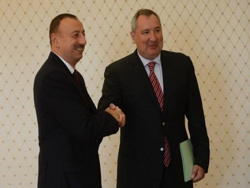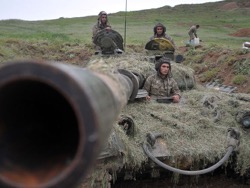
For the second week in Armenia does not abate the tension. After taking the armed radicals of the police building on July 17, the country began mass arrests of persons whom the authorities call extremists. Thousands of people took to the streets to demand their release and to call on authorities to prevent bloodshed. Why Armenia is in a systemic crisis, was it possible to foresee the radicalization of society and in the country killing policies. About this RFI said the expert of the Armenian Center for political and international studies Ruben Mehrabyan.
RFI: How would you characterize the current political and social situation in Armenia is unprecedented tension, which for several weeks has not abated in the country?
Ruben Mehrabyan: This can and should be described as systemic, institutional crisis, a crisis of confidence, which requires a speedy resolution, because those manifestations that take place to be in the form of violent actions by armed people, is fraught with the fact that the domestic political situation in Armenia may go the way of lebanonization. I am convinced that now the ball is in the government, and the government must initiate a political process through which all this discontent may be directed purely in the political mainstream, eliminating violence, and violence from the authorities and some nongovernmental groups.
— In your opinion, the authorities are conscious of the seriousness of this situation?
“I think they understand, because if it were not for this understanding, I think, in the first days after capture of a building of a regiment of patrol-guard service, they would go to the assault force with the desire to cut this knot. Now, according to the logic of action, the government is on the path of unleashing this node.
— That is the long silence of the authorities after the seizure of the police building on July 17 you explain that just understanding the seriousness?
— Understanding of the seriousness and the understanding that, in the end, the political responsible is the number one in all that is power. She blocked all legitimate mechanisms of influence of society on policy decisions or legal mechanisms of control over implementation of decisions. She blocked all legal mechanisms therefore become illegal. The whole structure of the socio-political system has turned into a boiling pot of brewed holes and the cover was hit in the forehead with the engineer of this design.
— Was it possible at all to assume that such could happen in Armenia?
— Of course, because the discontent is ripe, Mature and dissatisfaction in all areas of functioning state, whether it’s domestic policy, economic, and foreign policy, the policy on the Karabakh settlement. In addition, many silent are of the view that “anything, but in Karabakh provided relative security. But April’s four-day war showed that such considerations also groundless. So now we are left as in the Russian tale, before a broken trough.
Considering what happened, why this discontent has not resulted, for example, on the streets, and showed the capture of armed individuals, who are called the radicals, the police station in Yerevan?
— Here also there is a big fault on the part of the opposition, because all the street protests in the history of independent Armenia, on the one hand, suppressed power, on the other hand, “merged” leaders serving on the streets of the opposition. People have no trust to this method, i.e. the method of non-violent street rallies struggle. The last time was in 2008, and was followed by the actual shooting of protesters. All of the above and was the basis for this radicalization. You had time to assume and understand that it is impossible to kill policy in the country. Now in the country killed policy as such.
That is, in your opinion, a radical expression of social protest that, in some measure, a sign of desperation?
— Of course, this is desperate, in a situation when patience is full, and no solutions. Political actors willing to take responsibility for alternative ideas and their implementation, we also do not see all the political field scorched.
In Armenia, heavy in the throes of a dying post-Soviet system
And here in this political field, the armed individuals. How can they be described and what support they enjoy among the population?
Is, say, a radical group always performed with the radical slogans. To understand what is the perception of their ideas from the society, I will give only one fact: last year on the day of the centenary of the Armenian genocide (April 24, approx. RFI) they offered on this day to stand up and speak against the government. Of course, it found no response from the companies. Maybe my statement will seem controversial, but in Armenian society there is no culture of resolving political issues by force, for this it is very hard that the government, unfortunately, did. Policy with a gun is not acceptable in any case, she has no excuse.
— You gave the example of the unpopular proposals of these radicals in 2015. And as of now the society responds to the actions of these radicals?
The basic motive of those who go to meetings today, is that “got”: all political or pseudo-political practice that exists in the country, the situation on Karabakh. We see that Russian propaganda says that the Armenian side should take five districts in Nagorno-Karabakh, and what to receive in return — nothing is clear. Okay here is one: Russia seeks only to ensure that in the area of unresolved conflict at the expense of Armenian interests to increase your own presence and nothing more. There is a very great concern, given the over-dependency of Armenia from Russia, that Russia is still by pressure and blackmail might get their way. There is a very big concern on this score and a very large dissatisfaction with the government.
Among these armed men are those who fought in Karabakh and it is the veterans of that war. As far as the Karabakh factor is a component of their actions and the seizure of the building of the police pressure on the government?
— Judging by their statements, the Karabakh issue is a part, though important. So in society there are groups who consider these people heroes, the last hope that everything can change. In fact, we see that all this is happening against the background of almost silence of the authorities. She finished with only statements in the framework of good wishes, nothing more.
— These people can be called marginal, or today they enjoy even greater popularity among the society for its actions?
— It’s hard to say. But the fact that they are radicals is a fact. What is now on the background of total public dissatisfaction, they at least did something, even though it is beyond the scope of the law, but nevertheless it is a step against the background of complete inactivity and apathy, in General it is considered, of course, positive. Of course, this suggests that the country’s policies killed. We now see that the problem is not only in government, but the problem throughout the political field, which is simply detached from the real social demand. It is a political field exists as a thing in itself, not having any relation to society. In fact, like all power, it also is mistrust on the part of citizens.
— As events in Armenia can be entered in the current regional and international context?
— It fits very well in Armenia, in severe agony dying post-Soviet system, because it stopped working, it is degraded completely.







